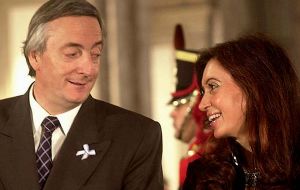MercoPress. South Atlantic News Agency
The Kirchner couple firmly at the rudder, says The Economist
 Pte. Kirchner and his wife elected President Cristina Fernandez
Pte. Kirchner and his wife elected President Cristina Fernandez The recent announcement of cabinet members of the incoming administration of Argentine elected president Cristina Fernandez de Kirchner confirms what had been expected: “not only the same advisors but also the policies of her husband, at least initially”, according to the latest edition from The Economist.
The magazine also concludes that the fact that a young minister with a low profile was named as the new minister of Economy "suggests that the main economic policy decisions will continue to be taken by the presidential couple". The Economist argues that Mrs. Kirchner was forced to advance the names of her team because of the re-emergence of tensions between high ranking officials within the Nestor Kirchner administration, which had been building over the past year but had been suppressed during the presidential campaign. Nevertheless they ended ousting Economy minister Miguel Peirano. The Economist says that Mr Peirano's decision also reflected the broader split between those in favor of a cabinet overhaul, notably cabinet chief Alberto Fernández, in order to refresh the government's image, and those who interpreted Mrs. Kirchner's electoral victory as a successful referendum on President Kirchner's own record, thus justifying the continuance of most high-ranked officials in their posts. However, "the appointments were probably also motivated by the desire to keep the administration in safe and experienced hands at the start of Mrs. Kirchner's term, when her government could well encounter considerable difficulties, as the shortcomings of her husband's fiscal, monetary, infrastructure and energy policies have become increasingly evident". These shortcomings have led, most significantly, to rising inflationary pressures and the threat of energy shortages and Mrs. Kirchner will have the opportunity to reshuffle her cabinet to provide a sense of "renewal" at a later stage. Julio de Vido, the minister of Planning, will stay in the new government. He is a controversial figure because of allegations of corruption linked to public-works contracts that he oversaw in his department, and he has frosty relations with the cabinet chief Alberto Fernandez. Jorge Taiana, the Foreign Affairs minister, will also remain in place, as will Nilda Garré, minister of Defence; Carlos Tomada, minister of Labour; and Alicia Kirchner, minister of Social Development. The current minister of Interior, Aníbal Fernández, will move to the Ministry of Justice, and Graciela Ocaña, currently head of PAMI, the health insurance system for retirees, will be the new Health minister. The main change is the split of the Ministry of Education into two: education, which will be led by Juan Carlos Tedesco, the current Secretary of Education, and Science and Technology, which will be led by Lino Barañao, a scientist. Florencio Randazzo, presently minister of government of the province of Buenos Aires, will be the new minister of Interior. However the harshest comments refer to Martín Lousteau, who is currently president of the Banco de la Provincia de Buenos Aires, a state bank, and will replace Mr Peirano as minister of Economy. Mr Lousteau is a 36-year-old economist with a Master's degree from the London School of Economics. He was minister of production in Buenos Aires province and prior to that an advisor to the president of the Central Bank, Martín Redrado. Like Mr Peirano and, prior to him, Ms Miceli, "Mr Lousteau shares Mr Kirchner's economic policy goal of a weak exchange rate". "The fact that Mrs. Kirchner has chosen a young minister with a low profile (instead of others who were in the running for the post, including Mario Blejer, former president of the Central Bank, or Beatriz Nofal, current head of the Investment Promotion Agency) suggests that the main economic policy decisions will continue to be taken by the presidential couple".




Top Comments
Disclaimer & comment rulesCommenting for this story is now closed.
If you have a Facebook account, become a fan and comment on our Facebook Page!